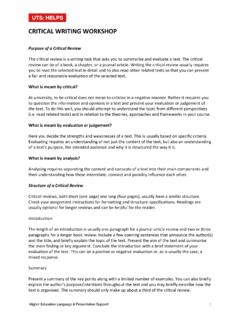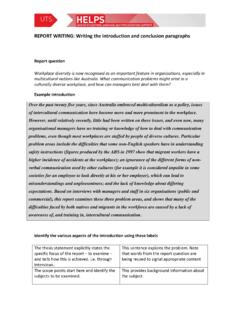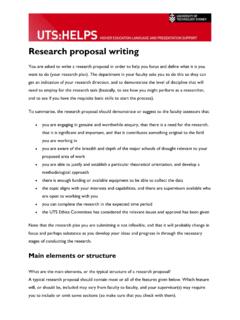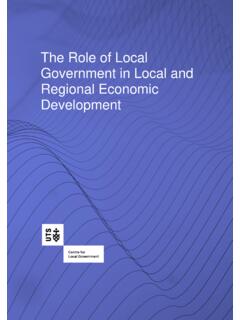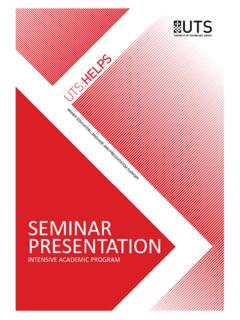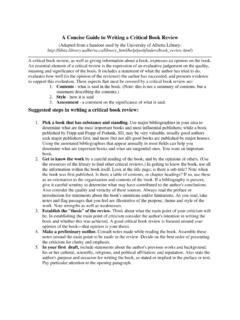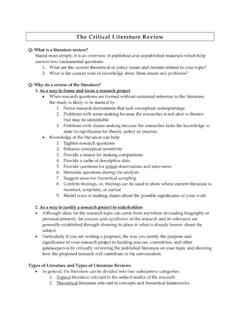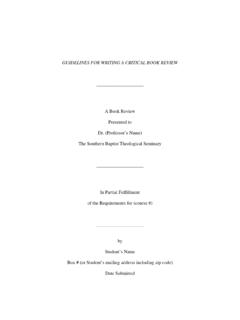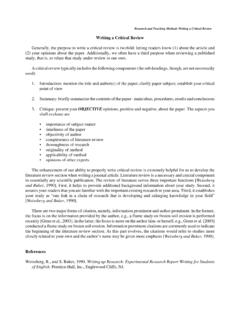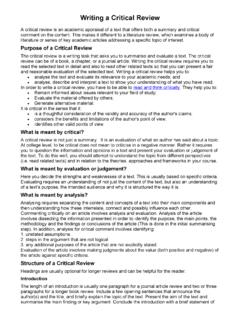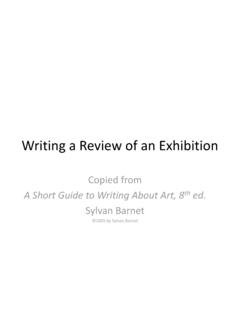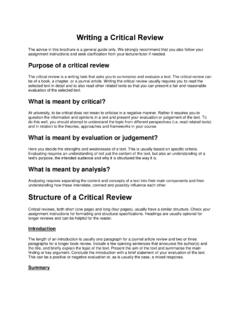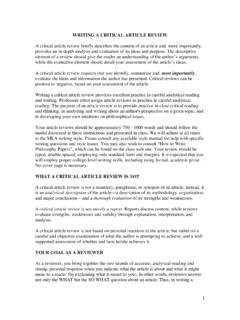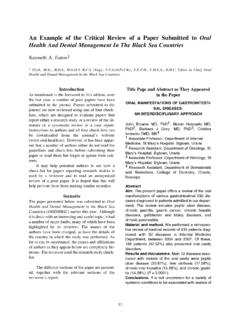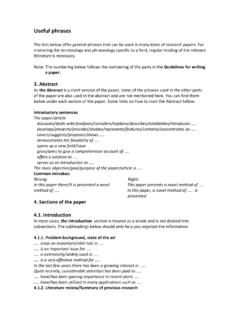Transcription of Critical review writing - University of Technology Sydney
1 Critical review writing The meaning of Critical review : Being Critical : o Involves or requires making judgments as to the truth, merit, relevance, effectiveness, breadth, contribution of something to a particular field, as well as its informational structure review : o the process of going over a subject again in study or recitation in order to fix it in the memory or summarise the facts o a general survey, esp. in words; report or account o to survey mentally; examine: to review the situation o to present a survey of in speech or writing There are a couple of underlying assumptions which you should be aware of when attempting to critically review any academic work in the area of your research: The literature is often written in expository, not literary style, and deals with information which is arranged accordingly To be able to make useful comments about any topic in your field, there should at least be an underlying knowledge base which provides a context and an understanding of the breadth of the subject matter (who is important, what is their contribution, what did he/she find etc.)
2 The first step is to acquire that knowledge base by wide reading according to the main descriptors or concepts that you have used to find the readings in the first place Skills to cultivate for research and Critical review You need to ask the reading questions. For For textbooks: What is the topic or subject area of this book? 2 What is the main purpose of this person's writing ? Why has this person written this book? (aims) What is the information structure of this writing ? How is the information arranged? What is the order of presentation? Was it according to time or topic or importance? What are the writer s main points and sub-points? Who are the most important researchers mentioned? What conclusions are reached? Was the text easy to read? Why/why not? Was the information arranged for easy retrieval?
3 Did the writer fulfill his/her aims? How new is the content? Are there other books on this subject matter? Did the writer miss any important researchers in this field? Does it seem to be up-to-date? Which points are of most interest to your areas of interest? Did it stimulate your interest? Is it relevant to your situation? For articles (journal, collection of readings and dissertations) What were the aims of this study? Why has the researcher done this study? What were the researcher's hypotheses? Were they clearly expressed? What were the results of the study? What conclusions were reached? Did this study advance the knowledge base of the discipline, confirm other research in the same area, or simply repeat what is already known by way of confirmation? Does it suggest to you areas for further research? Did it stimulate your interest?
4 Is it relevant to your situation? Language for reading and writing critically To be Critical in the context of reading and writing involves being able to: make judgements about what you read. These judgements may be positive or negative. Examples: o Several authors have categorised the effects of X in very useful ways o Many papers ignore factors such as X when considering the applications of Y define a phenomenon clearly by drawing on the key aspects of definitions provided by other authors. Examples: 3 o X is a difficult concept to define, because .. o The key concepts/aspects that are covered in existing definitions are A, B and C establish the relative significance or importance of different aspects of what you read. Examples: o The most urgent of these questions/challenges is X, because .. o The most important category identified appears to be X, since.
5 O The most frequently mentioned advantages are A, B, and C distinguish between contexts, and make judgments about the validity or relevance of certain ideas/information/solutions within those contexts. Example: o This solution has been shown to be extremely effective in small to medium enterprises, but it is debatable whether it would be appropriate in large enterprises show the relationship (similarities, differences) between different ideas, information, theories. Example: o While X theory focuses on the role of relationships in building trust, Y theory deals primarily with the way in which the Technology itself may enhance or diminish trust show the implications of different ideas/theories/solutions. Example: o From the perspective of X (theory), then, solutions would have to address ways of building relationships in an online environment, while from the perspective of Y (theory) solutions would involve developing effective user interfaces show an awareness of possible counter-claims on any issue.
6 Example: o The predominant view on X is that it can best be solved by means of Y. However, it could be argued that Y would only work in the case of there being certain constraints on competition between different organisations identify any gaps in the literature. Example: o One factor upon which appears to be overlooked is the influence of organisational structure on X practices identify trends and patterns in existing work. Examples: o Problems relating to X are increasingly being related to the use of .. o While the value of X is being emphasised in the context of Y, there is also a trend towards considering X in the context of Z rather than Y sum up key issues, implications, or problems that emerge from each section that you cover. Examples: 4 o It would seem, then, that X leads to Y, while A usually leads to F and G.
7 This means that, in taking a two-pronged approach, the disadvantages of introducing X can, to some extent, be mitigated by using A at the same time o To sum up, then, the crucial points to be taken into account are X and Y Adapted from the following sources: Royce, T 2009, The meaning of Critical review , ELSSA Centre, UTS. Royce, T 2009, Skills to cultivate for research and Critical review , ELSSA Centre, UTS. Royce, T 2009, Reading and writing critically, ELSSA Centre, UTS
